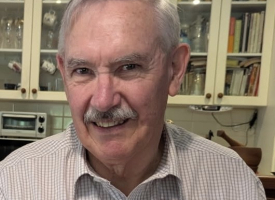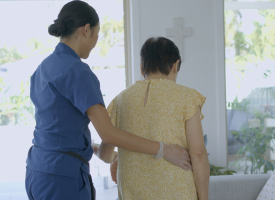Make or break time for nation's health
AMA urges end to funding blame game and says lifting lockdown restrictions must not destroy the health system

AMA President Dr Omar Khorshid says if Australia is to get its health system working for the benefit of all Australians and get through the COVID-19 crisis, governments must urgently invest in the sector and implement structural funding reform.
Dr Khorshid said a blame game had dominated previous discussions of health funding and reform.
Appearing before the Senate Select Committee on COVID-19 today Dr Khorshid said COVID-19 had compounded a crisis in health care.
He said one-off funding boosts would not address the problems, and neither would one-off initiatives like elective surgery blitzes. He said we could not continue to look at the health system, and its resourcing, through the current lens which focused on surge planning.
He said governments must look at the resourcing and planning around healthcare to make sure the system was sustainable and could cope into the future.
Dr Khorshid said the medical profession wanted to see society reopen and return to some semblance of normal. However, he said the health system had not been ready for the pandemic and it was not ready to deal with the consequences of opening up – particularly if opened up too quickly.
“We are worried that as we open up, the cracks in the healthcare system will widen and we will face very significant impacts, particularly if we open too fast or go too far ahead of our vaccination rates, which of course are the best way to protect the hospital system.
“So, the AMA believes you must be aiming for the highest possible vaccination rate as a society. We should be easing out of the restrictions in those states that are living with COVID-19 already, cautiously, slowly, and looking at the results before moving to the next phase of opening up, not waiting for the health care system to be overwhelmed before actually stopping,” Dr Khorshid told the hearing.
He said governments must prepare the health system to clear backlogs, deliver usual care, as well as meet the demands that COVID-19 will place on the system. These include the extra costs of more robust infection control and prevention measures and the impact these have on productivity.
Dr Khorshid said a sustained increase in funding across primary care and the public hospital system was needed, as well as long term reform of funding arrangements. He said public hospitals will need new infrastructure, more beds, more operating theatres, expanded emergency department and ICU capacity – and most of all, the extra staff needed to support these.
“We do see an urgent need to address the funding issues, the structural issues, the capacity of the healthcare system.
“What better time to start that conversation than when the AMA’s calls for attention to the sector are now very starkly visible, I think, to everyone in the community as the system fails - even in those states where we don't actually have COVID-19 just yet.
“I think some of the solutions are going to revolve around innovation - use GPs to prevent hospital admissions, and in particular when it comes to COVID working out how we can use our primary care network to monitor COVID-19 patients in the community and to help look after them without them having to go to hospital.
“So, this will require vision, cooperation, and an end to the blame game that has dominated our health system for so long,” Dr Khorshid told the hearing.
A focus of the Senate hearing today, was in relation to COVID-19 and its impact on children.
Dr Khorshid said he wanted to reassure parents that COVID-19 in children was generally mild and the risk of severe disease remains low.
“The Delta variant is more transmissible and more children are catching COVID-19, but we've not seen strong evidence as to whether the disease is actually more serious. There are mixed reports as to whether the disease is more serious than other variants in children and in fact in adults as well,” Dr Khorshid said.
He said the risks of Long Covid appeared to be much lower in children.
Dr Khorshid said however the risks to children should not be trivialised and he said there was a need to protect children.
He said in relation to children under 12 we would know more about the safety and benefits of vaccination toward the end of the year. He said in the meantime, there was much we could do to protect younger children, particularly in schools, focusing on areas such as ventilation and high uptake of vaccination among the staff around them, as well as making sure parents were vaccinated.



